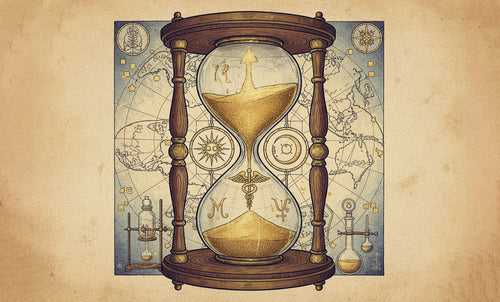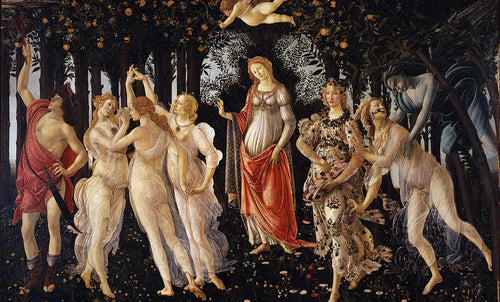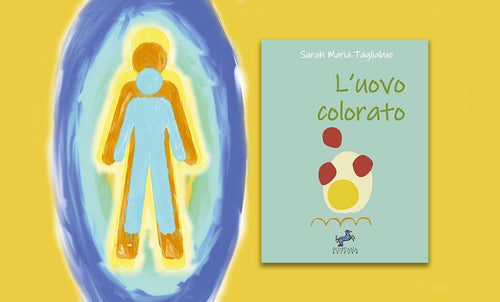
Self-Work: Exploring Gurdjieff's Approach and Its Spiritual Implications
Rocco FontanaToday we talk about "work on oneself", a profound and transformative concept, which has been widely explored in various spiritual traditions. One of the most distinctive and peculiar approaches is the one proposed by George Ivanovich Gurdjieff, a 20th century spiritual master who developed a system of teachings known as the Fourth Way.
In this article we want to offer an introductory overview of the topic, referring the reader to the necessary further information, starting from the bibliography at the bottom of the page.
Work on oneself, according to Gurdjieff, offers an opportunity for emancipation and personal growth that can profoundly transform our lives. The Armenian-Georgian master has developed a system of teachings that emphasizes the importance of self-observation, divided attention, awareness and knowledge. These are fundamental elements of the process of personal transformation, which you also find in other traditions (but I, personally, appreciate the Gurdjieffian system and this is what I am talking about), which can lead to greater self-awareness and a deeper understanding of the world that surrounds us. surrounds.
What does work on oneself mean according to Gurdjieff?
Work on oneself, according to Gurdjieff, is the intentional process of self-observation, self-knowledge and self-transformation. The goal is to achieve a state of higher awareness and conscious presence in one's daily life. Gurdjieff teaches that most people live in a state of sleep, unable to fully realize themselves and their actions.
His teaching is based on the idea that human beings are composed of different "centers" - the emotional center, the mental center and the motor or instinctive center - and that true inner development requires harmonizing and coordinating these centers. Through the practice of self-observation, awareness exercises and specific work, we aim to awaken dormant consciousness and integrate these centers to reach a higher state of awareness.
Let's read the words of an illustrious student, P. D. Ouspensky on the first attempts at self-observation:
“For most of us the main difficulty, as we soon saw, was the habit of speaking. Nobody saw this habit in himself, nobody could fight it, because it was always linked to some characteristic that man considered positive in himself. If he spoke about himself or others, it was because he wanted to be 'sincere', or because he wanted to know what someone else thought, or because he wanted to help someone, etc, etc...
I immediately realized that the fight against the habit of chatting or, in general, of talking more than necessary, could become a center of gravity of the work on oneself, because this habit interfered with everything, penetrated everything and was for many among the least noticed of us."
P. D. Ouspensky - Fragments of an unknown teaching
Peculiarities and advantages of working on oneself
One of the peculiarities of work on oneself according to Gurdjieff is its emphasis on conscious action in daily life. It's not just about internal reflection, but also about bringing awareness to everyday actions, thoughts and emotions. This practical approach makes self-work accessible and relevant to each individual's life. Forget, therefore, thoughts of hermitage and similar, the Way is here and now, totally immersed in the "banal" everyday life.
Work on oneself requires constant commitment to self-observation and monitoring, without judgment, one's reactions and thoughts. This practice of self-observation is fundamental to understanding the internal dynamics that influence our behavior. Through work on ourselves, we are invited to explore the different parts of ourselves, both those we consider positive and those we consider negative. Only through self-observation can we begin to accept all our parts and integrate them into a more complete and harmonious self. We report some words of Gurdjieff, with their usual characteristic style:
“I told them among other things that for a man who has already understood with his own reason what is worth - that is, who has recognized the exaggerated importance that he attributes to his presumed individuality, which, according to his own impartial judgment, in state of calm, represents nothing other than an almost complete "nothingness" - the essential work consists in acquiring the ability to dedicate, for a certain time, all one's possibilities and all one's energies to identifying the greatest possible number of anomalous facts that happen during the various physical and psychic processes, in other words in implementing what is defined as "self-observation".
And this proves to be absolutely indispensable so that the awareness of these undesirable facts, which up to now only his mental has been able to recognize, and which are still devoid of meaning due to his general presence, gradually imbues his nature and, crystallizing in him a firm conviction regarding everything he has learned, arouses in his general presence, according to a procedure compliant with the laws, an energy of great intensity which alone makes further work on oneself possible. This energy manifests itself, among other things, through a constant effort aimed at acquiring during the day, in other words during the "waking state", the power to "recall oneself" for a specific time".
George I. Gurdjieff - Real Life
Obstacles and Challenges in the Path of Self-Work
The journey of working on oneself can present significant challenges. The personal change required is profound and requires constant commitment and patience. It's easy to fall into routine and lack of awareness, and sometimes it can be disconcerting to observe aspects of yourself that you don't want or fully understand.
"Taken in itself, the being of a man presents multiple aspects. That of modern man is characterized above all by the absence of unity in himself and by the absence of the slightest trace of those properties that he especially loves to attribute to himself: the 'lucidity of 'consciousness', the 'free will', a 'permanent Ego' or 'I' and the 'capacity to do'. Yes, as astonishing as this may seem to you, I will tell you that the main characteristic of a person's being modern man, and this explains everything he lacks, is sleep."
Gurdjieff from: P. D. Ouspensky - Fragments of an unknown teaching
Work on oneself requires an authentic will to change, continuous commitment and adequate guidance. Without regular practice and a thorough understanding of the principles involved, the path can become confusing or superficial.
Awareness is the fruit of working on oneself. Through constant practice ofself-observation and ofdivided attention, we develop greater awareness of ourselves and others. We become more aware of our thoughts, emotions and behaviors, as well as the interpersonal dynamics that can influence our relationships. Awareness gives us the ability to choose how to respond to situations and break negative patterns that can limit us.
Comparison with Similar Concepts of Other Spiritual Traditions
The concept of working on oneself has similarities with many spiritual traditions. For example, in the Buddhist tradition, there is an emphasis on self-observation, meditation, and mindfulness to achieve enlightenment. In Stoic philosophy, self-control, acceptance, and virtue are central to achieving inner peace.
However, Gurdjieff's approach is distinguished by its combination of practical and philosophical teachings that aim to integrate intellectual knowledge with direct experience.
"Divided attention" is another key element of work on oneself according to Gurdjieff which we will develop in a future article. This involves the ability to maintain our attention on multiple levels at once - both on the external and internal world. This practice helps us develop greater awareness and avoid losing sight of the important aspects of our lives. Divided attention allows us to be present in the present moment, without being overly distracted by thoughts or worries. In doing so, we can seize opportunities and consciously respond to the challenges we encounter.
Conclusions
Work on ourselves, from whatever tradition it comes from, leads us towards a profound knowledge of ourselves and the world in which we live and becomes an indispensable condition for aspiring to live a real "true life" and to escape, as mentioned, from the condition of “sleep” in which we invariably find ourselves. Through inner research and the exploration of personal dynamics, we are invited to see beyond the illusions and limitations that imprison us and limit our potential.
Gurdjieff offers us a path of personal growth and transformation, designed specifically for a Western, apparently rational mind, which can lead to profound change in our lives. Through self-observation, divided attention, awareness and self-knowledge, we can free ourselves from the conditioning and limitations that trap us.
This invitation to explore the concept of self-work according to Gurdjieff is an opportunity to discover the potential that resides within us and to live a more authentic and satisfying life.
I conclude by pointing out that the work on oneself exposed in this article mainly concerns the fine-tuning of the "human machine" and therefore an essential first phase for a subsequent deeper development that navigates, in Gurdjieff's case (but the true traditions, for example at a certain point, they all begin to converge towards the same center) in profoundly Christian-gnostic waters.
Brief essential bibliography:
- P. D. Ouspensky - Fragments of an unknown teaching
- George I. Gurdjieff - Real Life
- George I. Gurdjieff - Meetings with Extraordinary Men
- George I. Gurdjieff - Views on the Real World















































